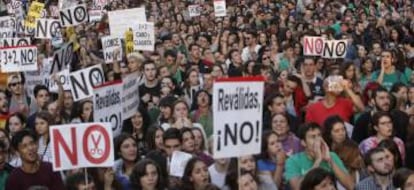Spain’s opposition joins forces against government education law
Move to stop standardized testing shows Rajoy can no longer ram legislation through Congress

Just weeks into office, Spain’s new minority government on Tuesday was given a taste of what life will be like over the course of Prime Minister Mariano Rajoy’s second term in office.
All opposition parties in the lower chamber voted in favor of considering a Socialist-sponsored bill to delay the implementation of the ruling Popular Party (PP)’s controversial education legislation, known as LOMCE.
The LOMCE was approved in 2013 thanks to the PP’s absolute majority
The LOMCE was signed into law in late 2013, but its contents are being applied gradually to Spain’s education system. One of its most controversial measures is the introduction of externally-assessed standardized tests (known popularly as reválidas) that students will have to pass in order to receive their high school and pre-university diplomas, regardless of how well they performed in school.
Faced with mounting opposition from other parties and parent groups, Prime Minister Rajoy recently announced that the test results would, for the time being, not be applied. The government is expected to approve a decree to this effect in early December.
On Tuesday, Education Minister Íñigo Méndez de Vigo announced an education sector meeting for November 28 “to reach an agreement to place the academic effects [of the standardized tests] on hold until a national education pact is reached.”

This is the first bill-related vote that the PP has lost to the Socialist Party (PSOE), Podemos, Ciudadanos and regional parties in Congress since Rajoy was sworn back into office on October 31, ending a 10-month political paralysis in Spain.
It is also a reflection of how the balance of power has changed inside the lower house following the emergence of protest parties Podemos and Ciudadanos. The LOMCE was approved in 2013 thanks to the PP’s absolute majority at the time, which enabled Rajoy to ignore the opposition’s vocal protests.
Now, Rajoy will have to seek vote-by-vote agreements on all matters of relevance if he hopes to get any legislation passed. The most pressing issue right now is the 2017 budget, which has been delayed due to a 10-month political deadlock following two inconclusive elections.
Punishment for Socialist rebels
The PSOE has started to dole out punishment to the Socialist deputies who violated the party’s instructions to abstain at the investiture session on October 29, and instead entered a conscience vote against Rajoy.
José Zaragoza and Pere Joan Pons will no longer be chairman and speaker of the Mixed Committee on the EU. They are two of 15 deputies who broke the rule stating that all party representatives must vote the same way.
The Socialists, who have faced serious criticism from some on the left for enabling a second Rajoy administration by abstaining at a congressional vote last month, said that Tuesday’s coordinated move against the LOMCE illustrates how it is possible to limit the policies of a minority government from the opposition benches.
But Podemos said that this is insufficient, as the law itself has not been repealed.
The PSOE holds that it is no longer possible to roll back the LOMCE, and that the best course of action is to slow down its implementation while hammering out new, consensus-based education legislation.
English version by Susana Urra.
Tu suscripción se está usando en otro dispositivo
¿Quieres añadir otro usuario a tu suscripción?
Si continúas leyendo en este dispositivo, no se podrá leer en el otro.
FlechaTu suscripción se está usando en otro dispositivo y solo puedes acceder a EL PAÍS desde un dispositivo a la vez.
Si quieres compartir tu cuenta, cambia tu suscripción a la modalidad Premium, así podrás añadir otro usuario. Cada uno accederá con su propia cuenta de email, lo que os permitirá personalizar vuestra experiencia en EL PAÍS.
¿Tienes una suscripción de empresa? Accede aquí para contratar más cuentas.
En el caso de no saber quién está usando tu cuenta, te recomendamos cambiar tu contraseña aquí.
Si decides continuar compartiendo tu cuenta, este mensaje se mostrará en tu dispositivo y en el de la otra persona que está usando tu cuenta de forma indefinida, afectando a tu experiencia de lectura. Puedes consultar aquí los términos y condiciones de la suscripción digital.








































